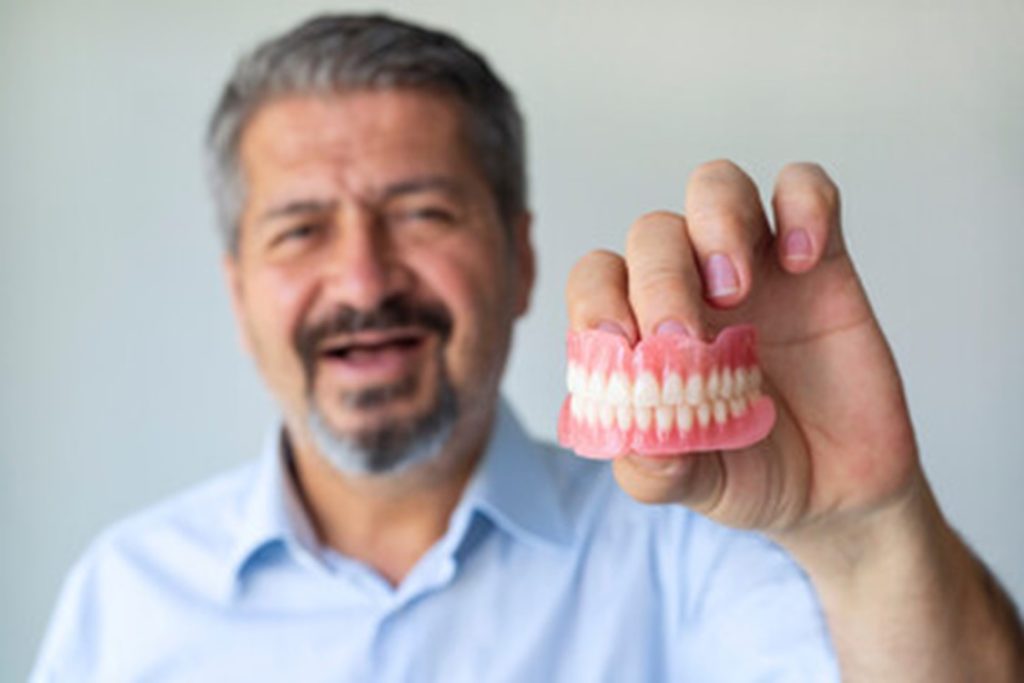
The American College of Prosthodontics estimates that roughly 40 million adults are missing all their teeth—that’s quite a large figure! Not only that, but having missing teeth is a very serious problem that can affect the way you talk, eat, laugh, and live. Luckily, dentures are an effective solution that can help to restore much of your mouth’s lost functionality. But did you know that dentures can also negatively affect your body’s overall nutrition? Keep reading to learn more about this connection and what you can do to ensure that your dentures don’t prevent you from fueling up.
The Link Between Dentures & Chewing Force
Traditional dentures are held in place with a special, gum-colored adhesive. The dentures rest on your gums and obtain their support through their shape and how they cover the jawbones—the better the fit, the better your dentures will function. The upper denture also uses suction to stay in place, and the lower denture relies on muscle control. When your dentures are in their correct positions, they can effectively move and function just like your missing natural teeth.
However, since traditional dentures are removable and not naturally affixed to anything in your mouth, they can easily become loose when you speak, chew, or move your jaw. This means that your mouth can’t apply the same amount of chewing force as normal! In fact, most studies show that wearing a full denture only gives you around 20-25% of your original bite force! Due to this severe reduction, you’re unable to effectively bite, tear, or grind certain foods like chewy meats, crisp fruits and veggies, starchy items like bread and potatoes and more.
How Chewing Force Impacts Nutrition
Since chewing is the first step of the digestive process, you aren’t off to a great start if you can’t effectively chew your food! The saliva in your mouth contains powerful digestive enzymes, and your teeth need to crush the food into smaller particles to assist your stomach in breaking everything down. Swallowing larger particles isn’t just a choking hazard; these bigger pieces are also much more difficult for your body to digest and extract nutrients from. If your body can’t digest your food, problems like malnutrition can develop. This means that wearing dentures can actively impact your nutrition through the reduction of your chewing force!
Implant-Supported Dentures Can Help
However, supporting your dentures with dental implants can significantly restore your chewing force. The implants assist your dentures the same way they’d normally assist your mouth. They provide a strong interlocking connection between your jaws and your dentures that adds a ton of foundational support. This means your dentures will remain stable in their correct positions over the jawbones. This stability also means that you’ll be back to fully chewing your food again and enjoying the nutritional benefits once your implants have fully healed.
Even though they’re meant to help you, your dentures can actually hurt you by reducing your chewing force and impacting your body’s overall nutrition! Talk with your dentist about implant-supported dentures to ensure that this doesn’t happen.
About the Practice
Daily Smiles MacArthur is proud to serve the dental needs of patients and families in Irving under the leadership of Dr. Rafiq Hirji! Dr. Rafiq received his dental doctorate from the University of Southern California School of Dentistry and has several years of experience and expertise in a wide variety of fields including cosmetic dentistry, orthodontics, pediatric dentistry, sedation dentistry and more. If you have any questions about the article or would like to schedule a visit, you can contact Dr. Rafiq online or by phone: (972) 546-4114.
